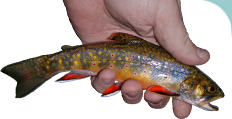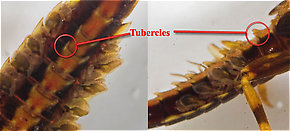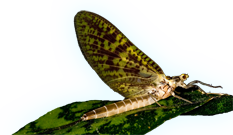Blog & Latest Updates
Fly Fishing Articles
Insects by Common Name


Wrapping up the Yellowstone trip
On the day my friend was set to fly out of Bozeman in the evening, we began by heading to the Firehole to fish early in the morning before the water got too warm. We planned to fish upstream through Fountain Flats from the bridge near the Ojo Caliente hot spring, more for the geothermal scenery than for any idea that the fishing might be particularly good there. However, thunderstorms with frequent air-to-ground lightning kept us in the car for nearly an hour at the parking lot waiting for a safe window to fish. While we waited, my friend read from my copy of Ernest Schwiebert's story about the Firehole, The Strangest Trout Stream on Earth. He commented, "That guy makes it sound like it's impossible to catch a fish on this river."
When we finally got out on the water, there were no rises and little to no sign of bug life. Although the occasional splashy refusal and a couple brief hookups kept things interesting, neither of us caught anything. Apparently, Ernie called it.
Once we decided the Firehole was a dud for the day, we picked up the trailer in West Yellowstone and drove up MT-191 through the Gallatin valley. We stopped to fish a couple times in the headwater reaches inside the park, first just shortly above the Taylor Fork confluence, where we fished a couple good pools with no action and decided the high, cold water from runoff wasn't helping matters. We drove back up into Fawn Pass, thinking those upper headwaters might cut some of the higher mountains out of the equation. The water was still a bit high, but more manageable, and I picked up a couple spunky mid-sized rainbows on nymphs.
With about an hour left before we had to leave from the airport, we decided to leave that spectacular scenery early in case something struck our fancy to fish farther down. In the valley near Big Sky, we were very glad we did, as we stopped at a pulloff to check out the river and found giant salmonflies in the air. We captured a few for photos, then broke out the rods. No fish seemed interested in a salmonfly limitation, but I did spot a couple risers, switch to a smaller attractor (Attractor: Flies not designed to imitate any particular insect, but to incorporate characteristics attractive to trout. When trout aren't feeding selectively, attractors often outperform careful imitations as searching patterns because they are easier to see and incorporate more strike-triggering characteristics. They include legends like the Adams, Bivisible, and Royal Wulff.) dry, and land a 12-13" rainbow. Then, running low on time, I switched to bug collecting and kick-netted a good mix of nymphs for the website.
Photos by Troutnut from the Firehole River and the Gallatin River in Wyoming and Montana

StateWyoming
LocationFirehole River
Date TakenJul 2, 2019
Date AddedJul 17, 2019
AuthorTroutnut
CameraNIKON 1 AW1

StateMontana
LocationGallatin River
Date TakenJul 2, 2019
Date AddedJul 17, 2019
AuthorTroutnut
CameraNIKON 1 AW1

StateWyoming
LocationFirehole River
Date TakenJul 2, 2019
Date AddedJul 17, 2019
AuthorTroutnut
CameraNIKON 1 AW1

StateWyoming
LocationFirehole River
Date TakenJul 2, 2019
Date AddedJul 17, 2019
AuthorTroutnut
CameraNIKON 1 AW1

StateMontana
LocationGallatin River
Date TakenJul 2, 2019
Date AddedJul 17, 2019
AuthorTroutnut
CameraNIKON 1 AW1

StateMontana
LocationGallatin River
Date TakenJul 2, 2019
Date AddedJul 17, 2019
AuthorTroutnut
CameraNIKON 1 AW1

StateMontana
LocationGallatin River
Date TakenJul 2, 2019
Date AddedJul 17, 2019
AuthorTroutnut
CameraNIKON 1 AW1

StateMontana
LocationGallatin River
Date TakenJul 2, 2019
Date AddedJul 17, 2019
AuthorTroutnut
CameraNIKON 1 AW1

StateWyoming
LocationFirehole River
Date TakenJul 2, 2019
Date AddedJul 17, 2019
AuthorTroutnut
CameraNIKON 1 AW1

It was surreal fishing this water up through the geyser basin at Fountain Flats.
StateWyoming
LocationFirehole River
Date TakenJul 2, 2019
Date AddedJul 17, 2019
AuthorTroutnut
CameraNIKON 1 AW1

StateWyoming
LocationFirehole River
Date TakenJul 2, 2019
Date AddedJul 17, 2019
AuthorTroutnut
CameraNIKON 1 AW1

StateWyoming
LocationFirehole River
Date TakenJul 2, 2019
Date AddedJul 17, 2019
AuthorTroutnut
CameraNIKON 1 AW1

StateMontana
LocationGallatin River
Date TakenJul 2, 2019
Date AddedJul 17, 2019
AuthorTroutnut
CameraNIKON 1 AW1
Closeup insects by Troutnut from the Gallatin River in Montana
Female Pteronarcys californica (Giant Salmonfly) Stonefly Adult View 11 Pictures
View 11 Pictures
 View 11 Pictures
View 11 PicturesCollected July 2, 2019 from the Gallatin River in Montana
Added to Troutnut.com by Troutnut on July 18, 2019
Added to Troutnut.com by Troutnut on July 18, 2019
Male Pteronarcys californica (Giant Salmonfly) Stonefly Adult View 16 Pictures
View 16 Pictures
 View 16 Pictures
View 16 PicturesCollected July 2, 2019 from the Gallatin River in Montana
Added to Troutnut.com by Troutnut on July 18, 2019
Added to Troutnut.com by Troutnut on July 18, 2019
Female Hesperoperla pacifica (Golden Stone) Stonefly Adult View 13 PicturesMy blurry photo at first makes it look like there might be a distinct notch in the subgenital plate of this specimen, but that's not the case -- just a poor photo. That's important to the ID.
View 13 PicturesMy blurry photo at first makes it look like there might be a distinct notch in the subgenital plate of this specimen, but that's not the case -- just a poor photo. That's important to the ID.
 View 13 PicturesMy blurry photo at first makes it look like there might be a distinct notch in the subgenital plate of this specimen, but that's not the case -- just a poor photo. That's important to the ID.
View 13 PicturesMy blurry photo at first makes it look like there might be a distinct notch in the subgenital plate of this specimen, but that's not the case -- just a poor photo. That's important to the ID.Collected July 2, 2019 from the Gallatin River in Montana
Added to Troutnut.com by Troutnut on July 18, 2019
Added to Troutnut.com by Troutnut on July 18, 2019
Pteronarcys californica (Giant Salmonfly) Stonefly Nymph View 13 Pictures
View 13 Pictures
 View 13 Pictures
View 13 PicturesCollected July 2, 2019 from the Gallatin River in Montana
Added to Troutnut.com by Troutnut on July 18, 2019
Added to Troutnut.com by Troutnut on July 18, 2019
Female Pteronarcys californica (Giant Salmonfly) Stonefly Adult View 14 Pictures
View 14 Pictures
 View 14 Pictures
View 14 PicturesCollected July 2, 2019 from the Gallatin River in Montana
Added to Troutnut.com by Troutnut on July 18, 2019
Added to Troutnut.com by Troutnut on July 18, 2019
Pteronarcys californica (Giant Salmonfly) Stonefly Nymph View 9 Pictures
View 9 Pictures
 View 9 Pictures
View 9 PicturesCollected July 2, 2019 from the Gallatin River in Montana
Added to Troutnut.com by Troutnut on July 18, 2019
Added to Troutnut.com by Troutnut on July 18, 2019
Hesperoperla pacifica (Golden Stone) Stonefly Adult View 14 PicturesI collected this specimen as a nymph and had it in line to be photographed, but it emerged inside my holding container before I got the chance. However, I was able to get some interesting photos of the very freshly-emerged adult that really demonstrate how strikingly colors can change within a few short hours after emergence. The before-and-after pictures are combined here under a single specimen since they portray the same individual at different times within the same stage.
View 14 PicturesI collected this specimen as a nymph and had it in line to be photographed, but it emerged inside my holding container before I got the chance. However, I was able to get some interesting photos of the very freshly-emerged adult that really demonstrate how strikingly colors can change within a few short hours after emergence. The before-and-after pictures are combined here under a single specimen since they portray the same individual at different times within the same stage.
Based on the identification of another specimen from the same date/site, I'm calling this Hesperoperla pacifica.
 View 14 PicturesI collected this specimen as a nymph and had it in line to be photographed, but it emerged inside my holding container before I got the chance. However, I was able to get some interesting photos of the very freshly-emerged adult that really demonstrate how strikingly colors can change within a few short hours after emergence. The before-and-after pictures are combined here under a single specimen since they portray the same individual at different times within the same stage.
View 14 PicturesI collected this specimen as a nymph and had it in line to be photographed, but it emerged inside my holding container before I got the chance. However, I was able to get some interesting photos of the very freshly-emerged adult that really demonstrate how strikingly colors can change within a few short hours after emergence. The before-and-after pictures are combined here under a single specimen since they portray the same individual at different times within the same stage.Based on the identification of another specimen from the same date/site, I'm calling this Hesperoperla pacifica.
Collected July 2, 2019 from the Gallatin River in Montana
Added to Troutnut.com by Troutnut on July 18, 2019
Added to Troutnut.com by Troutnut on July 18, 2019
Female Siphlonurus alternatus (Gray Drake) Mayfly Spinner View 7 PicturesI'm tentatively classifying this one as Siphlonurus alternatus, because it seems to fit that species best in the old keys in Needham's Biology of Mayflies, but I'm hesitant because I can't find documentation that southwest Montana or the surrounding area is within the species' range, although they are widely distributed throughout eastern North American and western Canada.
View 7 PicturesI'm tentatively classifying this one as Siphlonurus alternatus, because it seems to fit that species best in the old keys in Needham's Biology of Mayflies, but I'm hesitant because I can't find documentation that southwest Montana or the surrounding area is within the species' range, although they are widely distributed throughout eastern North American and western Canada.
 View 7 PicturesI'm tentatively classifying this one as Siphlonurus alternatus, because it seems to fit that species best in the old keys in Needham's Biology of Mayflies, but I'm hesitant because I can't find documentation that southwest Montana or the surrounding area is within the species' range, although they are widely distributed throughout eastern North American and western Canada.
View 7 PicturesI'm tentatively classifying this one as Siphlonurus alternatus, because it seems to fit that species best in the old keys in Needham's Biology of Mayflies, but I'm hesitant because I can't find documentation that southwest Montana or the surrounding area is within the species' range, although they are widely distributed throughout eastern North American and western Canada.Collected July 2, 2019 from the Gallatin River in Montana
Added to Troutnut.com by Troutnut on July 18, 2019
Added to Troutnut.com by Troutnut on July 18, 2019
Drunella flavilinea (Flav) Mayfly Nymph View 6 PicturesAlthough the identification is not certain because the nymph is not yet mature, the configuration of tubercles (
View 6 PicturesAlthough the identification is not certain because the nymph is not yet mature, the configuration of tubercles ( Tubercle: Various peculiar little bumps or projections on an insect. Their character is important for the identification of many kinds of insects, such as the nymphs of Ephemerellidae mayflies.) on this one--particularly the forefemora--seems to best match Drunella flavilinea.
Tubercle: Various peculiar little bumps or projections on an insect. Their character is important for the identification of many kinds of insects, such as the nymphs of Ephemerellidae mayflies.) on this one--particularly the forefemora--seems to best match Drunella flavilinea.
 View 6 PicturesAlthough the identification is not certain because the nymph is not yet mature, the configuration of tubercles (
View 6 PicturesAlthough the identification is not certain because the nymph is not yet mature, the configuration of tubercles (
A few (not all) of the abdominal tubercles on this Ephemerella needhami nymph are circled. They are especially large in this species.
Collected July 2, 2019 from the Gallatin River in Montana
Added to Troutnut.com by Troutnut on July 18, 2019
Added to Troutnut.com by Troutnut on July 18, 2019
Drunella doddsii (Western Green Drake) Mayfly Nymph View 4 Pictures
View 4 Pictures
 View 4 Pictures
View 4 PicturesCollected July 2, 2019 from the Gallatin River in Montana
Added to Troutnut.com by Troutnut on July 18, 2019
Added to Troutnut.com by Troutnut on July 18, 2019
Drunella doddsii (Western Green Drake) Mayfly Nymph View 4 Pictures
View 4 Pictures
 View 4 Pictures
View 4 PicturesCollected July 2, 2019 from the Gallatin River in Montana
Added to Troutnut.com by Troutnut on July 18, 2019
Added to Troutnut.com by Troutnut on July 18, 2019
Drunella grandis (Western Green Drake) Mayfly Nymph View 3 Pictures
View 3 Pictures
 View 3 Pictures
View 3 PicturesCollected July 2, 2019 from the Gallatin River in Montana
Added to Troutnut.com by Troutnut on July 18, 2019
Added to Troutnut.com by Troutnut on July 18, 2019
Drunella grandis (Western Green Drake) Mayfly Nymph View 3 Pictures
View 3 Pictures
 View 3 Pictures
View 3 PicturesCollected July 2, 2019 from the Gallatin River in Montana
Added to Troutnut.com by Troutnut on July 18, 2019
Added to Troutnut.com by Troutnut on July 18, 2019
Female Rhithrogena Mayfly Spinner View 3 Pictures
View 3 Pictures
 View 3 Pictures
View 3 PicturesCollected July 2, 2019 from the Gallatin River in Montana
Added to Troutnut.com by Troutnut on July 18, 2019
Added to Troutnut.com by Troutnut on July 18, 2019
Atherix (Watersnipe Flies) True Fly Larva View 8 Pictures
View 8 Pictures
 View 8 Pictures
View 8 PicturesCollected July 2, 2019 from the Gallatin River in Montana
Added to Troutnut.com by Troutnut on July 18, 2019
Added to Troutnut.com by Troutnut on July 18, 2019
«Older: Putting on the miles from West YellowstoneNewer: Lazy sightseeing around Bozeman on July 4th»
Most recent comments on this post (latest on top)
Comment on this post
Top 10 Fly Hatches
Top Gift Shop Designs
Eat mayflies.
Top Insect Specimens
Miscellaneous Sites
Troutnut.com is copyright © 2004-2024 Jason
Neuswanger (email Jason). See my FAQ for information about use of my images.
 privacy policy
privacy policy
